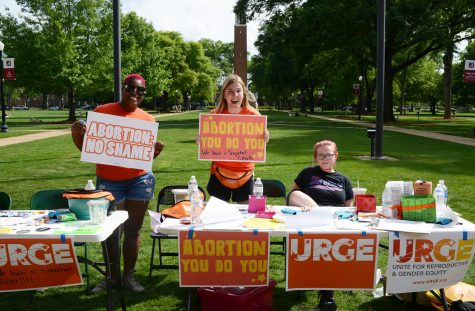Abortion-rights advocates: ‘Abortion is part of sexual health care’

CW File
February 13, 2020
For years, the state of Alabama has been a hotbed of disagreement on the issue of abortion, especially in the wake of last year’s attempted abortion ban.
The ban, named House Bill 314, or the “Human Life Protection Act,” would have banned all abortions in the state except cases where there is a serious health risk to the mother, making it a Class A felony for any doctor to perform an abortion, carrying with it a threat of up to 99 years in prison. The legislation also classified attempted abortions as a Class C felony.
The bill, originally signed into law in May, was blocked by a federal judge in October, making it the latest in a string of attempts to restrict abortion access across the country. HB 314 was one of several abortion restrictions being implemented by various states that were intended to challenge the 1973 Roe v. Wade decision and force a ruling by the Supreme Court, which currently has a conservative majority after President Donald Trump appointed associate justices Neil Gorsuch and Brett Kavanaugh to the court.
Another point of contention regarding abortion is access to information about the procedure. Pro-choice advocates argue that the knowledge of what an abortion is and how to obtain one is an important part of taking control of one’s health and that such information should be included in sexual education classes.
Helmi Henkin, former chair of the West Alabama Clinic Defenders and a UA alumna, said that abortion access is a vital part of sexual health.
“Everybody deserves access to the information and resources necessary to exercise their right to bodily autonomy and make the best decisions for their lives, families and communities,” Henkin said. “Sex education is often the first time that students learn about contraceptive options and reproductive health, so it is vital that the curriculum is scientifically accurate, LGBTQ-inclusive and sex-positive. Abortion is an essential component of reproductive healthcare and should be available safely, legally and without apology. Including information about abortion in sex education curriculum destigmatizes the procedure and further empowers students to take control of their futures.”
Though minors are required to have parental consent in order to obtain an abortion, pro-choice advocates argue that schools still have an obligation to teach students about the subject and how to access those services.
Unite for Reproductive and Gender Equity (URGE) is a student group that “advocates for sexual and reproductive justice on the local level,” according to their website. Annabeth Mellon, president of the UA chapter of URGE, said that young people need to have access to information about abortion.
“Teenagers have sex like anyone else does, and they deserve to have full access to information regarding their options should they become pregnant,” Mellon said. “Deciding to parent or carrying a pregnancy to term is a hugely personal decision, especially when one is still in school or financially dependent on others, so making sure high schoolers know what to do, should they need to terminate a pregnancy, is crucial to their health and wellbeing.”
Implementing sex ed that includes information on abortion can play a part in reducing the societal stigma surrounding abortion, Mellon said.
“Abortion, like any other reproductive care, is totally normal and completely safe, so there’s no reason to exclude it from conversations about sexual and reproductive health,” Mellon said. “If high schoolers are old enough to masturbate and have sex – which they are – then they need to know how to take care of themselves and their bodies, whether that’s through regal wellness exams, birth control, STI testing or abortion.”
Pro-choice advocates argue that the line between having a right and actually having access to exercise that right has become blurred as various states attempt to pass legislation to make it harder to access abortion services.
Anne Elisabeth Poe, a second-year law student, is president of the UA chapter of the “If/When/How: Lawyering for Reproductive Justice,” a reproductive justice advocacy group in the law school.
“Knowledge is the first step to having access to anything,” Poe said. “Reproductive justice starts with giving everyone the same access to the same knowledge. We need to know how our bodies work, and we need to know what steps we can take to best benefit what we want for our lives.”
Reflecting on her own experience with sex-ed class, Poe said that abstinence was the main way that her class was told to protect themselves from unwanted pregnancy and sexually transmitted diseases, an approach she believes was “unrealistic” and “inadequate.” Looking forward, Poe hopes that young people will be able to gain access to adequate sex education to make informed decisions on their health.
“Taking morality and religion out of the equation, this is science … This is health care,” she said. “You deserve to have the knowledge to be able to make the best decisions for yourself.”










